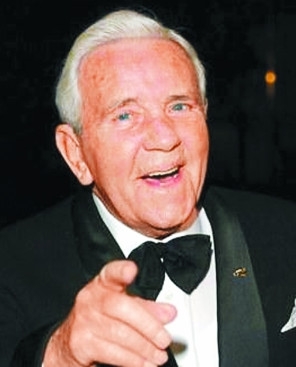(单词翻译:单击)

Obituary;Norman Wisdom;
讣告;诺曼·威斯登;
Sir Norman Wisdom, comedian, died on October 4th, aged 95
英老牌喜剧演员诺曼·威斯登爵士于10月4日辞世,鹤寿95。
What a chirpy little fellow that Norman was! All puppy eyes, rubber legs and innocent smiles, even when the world was crashing round him. Show him a grand piano, and he'd have to dive into it. Suggest a manhole, and he'd plummet straight down it. Run a cable across the road and he'd go flying into next week. He'd fall over his own shadow, or box it into a pulp behind the sofa; he'd fall over his own feet, and saunter on singing.
诺曼,多么活泼的小矮子! 他,有着十足的小狗眼、橡皮腿和即使是世界末日也没心没肺的笑。见到大钢琴,他一定会朝里钻,说有一个坑,他一定会径直往下跳,见到横穿道路的电缆,他一定会在下星期表演绊倒。他会被他自己的影子绊倒,甚至,他把自己的影子装进沙发后的纸桨盒;他也会被自己的双脚绊倒,随后又唱着歌儿闲逛。
It's true they didn't find him uproarious everywhere. He'd rock them in the aisles in Blackpool, but raise only a shrug in New York. His mime of eating a sandwich on a fast-moving train would leave them cold in Glasgow, but make them fall about in Tehran—and in Moscow and Buenos Aires and, very oddly, in Tirana, where perhaps the only possible reason was that they were as mad as himself.
这一点倒是不假——并不是每一地方的人们都认为他的表演令人发笑。虽然,在黑泽,他会使人们笑破肚皮,但是在纽约,人们只会对他的表演来一个耸肩示疑。虽然,他在一列飞驰火车上吃三明治的哑剧表演,打动不了格拉斯哥人,但是,他会使德黑兰、莫斯科和布宜诺斯艾利斯的人们捧腹大笑。很是讶异的是,地拉那的人们亦一样捧腹,地拉那,[那可是共产主义国家阿尔巴尼亚的首都哟],或许,地拉那人捧腹的唯一可能原因是他们也像诺曼一样发了狂。
He was born grinning, it seemed. He was certainly born small, and never made much progress after. The littlest in his gang at school, the tiny cabin boy aboard the Maindy Court sailing for Argentina, almost the scrawniest in his regiment in India in the 1930s. Everyone's mascot, jester, dogsbody, hoping to foil the punches by rolling over and begging for a pat on the head. He was five-foot-four on a good day, easily dwarfed by bosses, army sergeants, aristocrats or rivals for the willowy girls who strolled into his life. When his second wife walked out on him in 1968 he couldn't help remarking, bitterly, that she had left him for someone handsomer and taller.
诺曼似乎是咧嘴笑着出生的。他出生时一定也很小,而且后来也从未见长大了多少。在学校时,他是小伙伴中最小的。上世纪30年代,他是印度驶向阿根廷的美蒂宫廷号船上的一个小不点式的船舱侍应生,几乎是侍应生中瘦得皮包骨最严重的一个。他成了船上每一个人的吉祥物、供人逗乐者、打杂工,希望通过打滚并乞人拍其头来彰显自己重要。他过上一段好日子的时候,身高1米64,一位身材纤长的姑娘进入了他的生活。他的身高在上司、军士、贵族或对手面前,明显相形见绌。1968年,他的第二位妻子遗弃了他,他痛不自禁地诉说,她离开他是因为某个人比他更英俊更高大。
Smallness shaped Little Norm, but poverty taught him something, too. As a boy, thrown out by his drunken father, he slept rough in London and stole to eat. The gutter wasn't a bad place, considering. He learned things there, such as how to lift eggs very nimbly and delicately from a stall and secrete them, uncracked, in his pockets. He also acquired the trick of making his lower lip tremble when asking, his pathetic face only just above the counter, for a free pie from a coffee stall. By the time of his first hugely successful film, “Trouble in Store” (1953), he could stretch the pathos really far: to the point where, soaking wet after a tumble into a duck-pond, he sadly serenaded his love in a teashop, and then found he had nothing in his pockets to pay with except one small, wriggling fish.
贫穷决定了矮子诺曼的人生方向,但贫穷也教会了他某些东西。在他还是一个少年的时候,他的父亲就把他赶出家门,他在伦敦露宿街头,偷窃为食。就他而言,贫民窟还算是好去处。伦敦岁月,他学到了本领,比方:如何敏捷灵巧地把蛋从摊子上偷走并在他口袋中完好地隐藏起来。他也学到了在乞讨时使下唇发抖的技巧,乞讨时,为了向咖啡摊主讨要一块免费馅饼,他把自己脸刚好伸在柜台上方,显出一副凄惨面容。到1953年,他的首部获得巨大成功的电影《麻烦要来》上演之时,他把他的装可怜的本领发挥到了极至:在一个简明的场景里,他在滚进一鸭子池塘全身湿透后,于一间茶馆向他爱慕的女子凄凉地唱起小夜曲,而随后付账时,他才发现衣袋里除了一条小小的、扭动着的鱼,分文没有。
Yet he'd always find a swagger from somewhere, and carry on. With this attitude he worked his way through provincial theatres in the 1940s, dying and thriving by turns. When theatre managers slammed doors in his face he'd just keep on, “Give us a chance, Mr Smith”, “Let me sing you a song, Mr Jones”, until he wore them down with sheer persistence. When he was allowed on the stage for long enough, tap-dancing and pratfalling all over the place, everyone loved him and the audience went wild. And never wilder than on that April night in 1948 when he marched through the door of Bernard Delfont's London Casino and became an overnight sensation. “Welcome to the West End, Norman,” Mr Delfont said.
然而,他总是努力使自己显得自信满满,并践行之。在40年代,他凭着这种心态挤进了各地方戏院,尽管生计时好时坏。有时,戏院老板将他拒之门外,他会不断争取,“史密斯先生,给我一个机会”,“琼斯先生,我给你唱支歌吧”,直到由于他的死缠滥打使老板们厌烦而最终接收他。当他在舞台上得到机会有足够长的时间表演踢踏舞和旋地舞后,人人都迷上了他并欣喜若狂。但没有哪一次狂欢比得上1948年4月的狂欢——他步入伯纳德·德尔方特娱乐场大门造就的彻夜狂欢。“诺曼,城西区欢迎你”,德尔方特道。
Life's physical batterings trained him up, too. His father sometimes beat him so savagely that his head hit the ceiling before he crashed, but that taught him how to fall. People bullied and belted him, so he learned how to box, and that became part of his act on a regular basis. Did he whip his tormentors? Not half! Every time he went down, on stage or screen, he would struggle up with smouldering determination. Even pounded into the mud until he swallowed it, as he was in a football match in “Up in the World” (1956), he emerged as “that dangerous little man”, baring his teeth like a tiger.
生活的沉重打击也促使他奋力前行。有时,他父亲对他的殴打是如此残忍,以至于在他崩溃前,头已撞到天花板。但是,这教会了他如何使伤害小一些。人们欺凌他,殴打他,让他学会了如何躲避伤害。而且,这些经历也成了他表演节目中的不可或缺的一部分。他对伤害他的人还以拳头否?绝不!每当他在舞台或屏幕上出现表演失误,他都会用心中潜伏的坚强意志奋力再战。就像他于1956年出演的电影《平步青雲》中一场足球赛那样,即使被捣成烂泥,也要坚持到把烂泥吞下去。电影中,他扮演“富有攻击性的矮小子”,这小子露出像老虎一样的牙齿。
He never forgot to be dignified, though. Perhaps this was why Albanians liked him. Higher-ups (and his world was entirely full of higher-ups) could treat Little Norm with contempt, but he would triumph somehow. He would walk on their grass, turn his hose on their tailored backs, or tip the entire navy top brass over the rail and into the sea. He was as good as they were. Scruffy he might be, with tie askew and too-short trousers, but he was not a tramp. And though barked at by his superiors, especially the despairing Mr Grimsdale, he would just come sunnily back with his bright but disastrous ideas.
然而,他没齿未忘的是,人——是有尊严的。 也许,这就是阿尔巴尼亚人喜欢他的原因。虽然,小矮子诺曼之上的大人物们(他的人生中处处有大人物)对他以蔑视待之,但他总会有办法对付他们。他会在大人物的草坪上散步,脱下自己的裤子换上大人物们的定制服装,或者,掀掉草坪围栏上的全部上好的藏青铜饰并将其抛入海中。实际上,他们与他没有两样。虽然,他也许衣装褴褛、领带斜系、裤子太短,但他并不是一个流浪汉。虽然,他的上司,特别是令人失望的 Grimsdale先生曾如狗叫一般使唤他,但他也只是快乐地回忆起他的辉煌而不是曾经的那些坏念头。
Once he had decided that comedy was his life, he practised and practised. This discipline the army taught him—as well as how to play 11 instruments, and trip up people on parade. When he caused hilarity once by falling off a horse, he rehearsed more such tumbles until he was black and blue. At work, he would go through his routines from 9am till just before six in the darkened theatre; out of work, he would spend hours pulling faces in mirrors. His reward was stardom in the 1950s and 1960s, a knighthood in 2000, a yacht and several gleaming motors. He had to skip in the 1980s to a mansion in the Isle of Man, so the tax man wouldn't get him.
一旦他决定把喜剧表演作为他的生存手段,他就练习再练习。这种训练习惯都是他在从军生涯中养成的——他也学会了演奏11种乐器和在游行中向人群表演绊倒。一旦他的马摔表演引起轰动,他通常加倍表演,直到遍体鳞伤。上班时,他会从上午九点到晚上六点剧院漆黑一片,做完日常事务。下班后,他又花数小时在镜前拉脸。上世纪50到60年代,他的收入来自他的演员职业。2000年,他被授予爵士,有一艘快艇,数辆闪亮的摩托。80年代,他不得不悄然溜到马恩岛的一公馆,以便收税员找不到他。


